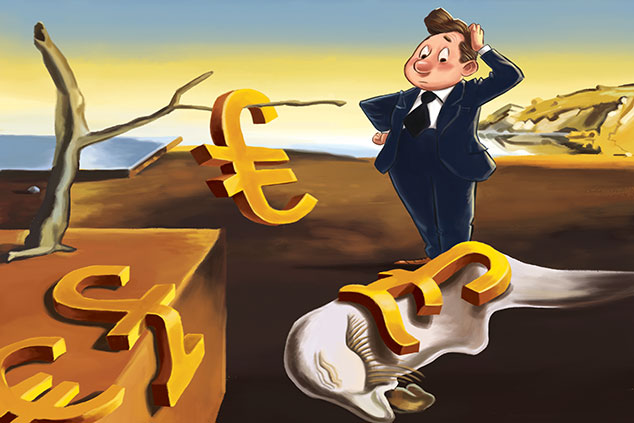Negative interest rates are a crazy idea – could they happen here?
Matthew Lynn explains why negative interest rates would wreck Britain's economy.

Get the latest financial news, insights and expert analysis from our award-winning MoneyWeek team, to help you understand what really matters when it comes to your finances.
You are now subscribed
Your newsletter sign-up was successful
Want to add more newsletters?

Twice daily
MoneyWeek
Get the latest financial news, insights and expert analysis from our award-winning MoneyWeek team, to help you understand what really matters when it comes to your finances.

Four times a week
Look After My Bills
Sign up to our free money-saving newsletter, filled with the latest news and expert advice to help you find the best tips and deals for managing your bills. Start saving today!
For anyone worrying about how to meet the next mortgage payment, or how they will ever borrow enough to buy a shoebox masquerading as a flat in east London, here is some cheering news. A bank in Denmark is now paying customers to borrow money.
Nordea Credit is now charging some mortgage borrowers a negative interest rate on their loans. In effect, instead of you paying the bank, it pays you (although there are still some administration charges it's a bank, after all). This is the through-the-looking-glass world of negative interest rates and it may not be long before it arrives in the UK.
There is no zero bound
It used to be assumed that interest rates were limited by what economists call the "zero lower bound". While there was no limit to how high a central bank could push rates if it wanted to, it couldn't ever take them below zero. But since the financial crisis, that idea has gone out of the window.
MoneyWeek
Subscribe to MoneyWeek today and get your first six magazine issues absolutely FREE

Sign up to Money Morning
Don't miss the latest investment and personal finances news, market analysis, plus money-saving tips with our free twice-daily newsletter
Don't miss the latest investment and personal finances news, market analysis, plus money-saving tips with our free twice-daily newsletter
Two major European countries have now taken rates negative. The Swiss National Bank took rates down to -0.25% last year and in January took them down again to -0.75%. In some cases, it'll now cost you money to have cash on deposit in Switzerland. Denmark has made the same move, last week pushing rates to -0.5%. The lower bound has been decisively broken.
In Britain, we're still debating about when the Bank of England will finallyget around to raising rates from what were meant to be emergency lows.But are we really so radically different from the Swiss or the Danes? There is no reason why the Bank which has jumped enthusiastically on every other central-banking fad going wouldn't cut rates too. And there are several pressures building that might drive it to do so.
The Swiss and the Danes are mainly trying to stop their currencies from rising too fast against the euro (or maintaining a peg to the euro, in the case of the Danes). This would damage their exporters in their biggest market.
But you can say the same for the UK. The pound has already started climbing against the euro,and as the European Central Bank (ECB) cranks up its printing presses, that is likely to continue. Europe is the biggest market for our exporters too, accounting for half of what we sell abroad. Negative rates might be the only way of stopping the pound from going too high.
Crisis candidates
And what happens if there is another shock to the global economy? Greece or Russia could default, or the Chinese economy could crash there is no shortage of crisis candidates. The Bank of England wouldn't have any tools left in its locker to counter the recession that might follow except for taking interest rates negative.
Finally, what happens if deflation takes hold? We're not there yet but with the oil-price slump, we might be soon. If prices start to fall significantly, then negative interest rates may not seem so crazy. If deflation is running at -2% a year, then even an interest rate of 0.5% works out at 2.5% in "real" (after inflation) terms, high by current global standards.
No doubt the Bank would rather get inflation back up to its target rate of 2%. But if it can't do that and it doesn't seem to have much influence on inflation one way or the other anymore then negative rates might be the only option. In short, negative rates cannot be ruled out. They are not likely, but neither are they impossible it is not as if Denmark and Switzerland are radically different economies to ours.
Negative interest rates are a dangerous idea
That said, let's hope we don't end up going through the looking glass, because it is very hard to see negative rates as being anything other than damaging to our economy. Just think about the medium-term consequences. Savers will be punished even more than they have been. We might have to pay to keep cash in the bank. That can only discourage saving even more, as well as hitting anyone living on their savings.
Worse, it will encourage both governments and individuals to take on even more debt. Why get the deficit down when you can borrow money from the bond market at less than nothing? The UK is not there yet, but many German bonds now have negative yields. Government profligacy will be encouraged the last thing the UK needs.
As for what negative rates might do for the UK's already weird property market, it hardly bears thinking about. If building societies start paying people to take out mortgages, then the market will be even more unhinged than it already is and much of the market was already fairly over-leveraged even when people had to pay for the money.
But just because it is a bad idea does not mean it won't happen. You could have made many of the same arguments against near-zero rates and quantitative easing yet both have come to be seen as perfectly normal. Just don't be surprised if the UK joins Switzerland and Denmark on the other side of the zero bound.
Get the latest financial news, insights and expert analysis from our award-winning MoneyWeek team, to help you understand what really matters when it comes to your finances.

Matthew Lynn is a columnist for Bloomberg and writes weekly commentary syndicated in papers such as the Daily Telegraph, Die Welt, the Sydney Morning Herald, the South China Morning Post and the Miami Herald. He is also an associate editor of Spectator Business, and a regular contributor to The Spectator. Before that, he worked for the business section of the Sunday Times for ten years.
-
 How to navigate the inheritance tax paperwork maze in nine clear steps
How to navigate the inheritance tax paperwork maze in nine clear stepsFamilies who cope best with inheritance tax (IHT) paperwork are those who plan ahead, say experts. We look at all documents you need to gather, regardless of whether you have an IHT bill to pay.
-
 Should you get financial advice when organising care for an elderly relative?
Should you get financial advice when organising care for an elderly relative?A tiny proportion of over 45s get help planning elderly relatives’ care – but is financial advice worth the cost?
-
 What would negative interest rates mean for your money?
What would negative interest rates mean for your money?Opinion There has been much talk of the Bank of England introducing negative interest rates. John Stepek explains why they might do that, and what it would mean for your money.
-
 Is the UK heading for negative interest rates?
Is the UK heading for negative interest rates?News The hints that negative interest rates are heading for Britain are now coming thick and fast.
-
Prepare yourself for negative interest rates
Editor's letter There is a lot of talk about negative interest rates coming to the UK. They're a terrible idea, says Merryn Somerset Webb.
-
Trump urges the US Federal Reserve to bring in negative interest rates
News Donald Trump has urged the Federal Reserve to embrace negative interest rates.
-
 What are negative interest rates and could they happen here?
What are negative interest rates and could they happen here?Analysis Negative interest rates – where banks pay you to borrow money – now exist in many parts of the world. John Stepek explains why they are a terrible idea, and how likely we are to see them in the UK.
-
The dangers of negative interest rates
Features Negative interest rates could spark the next financial crisis. And central bankers could end up the object of the public's wrath, says Merryn Somerset Webb.
-
 Navigating the weird world of negative interest rates
Navigating the weird world of negative interest ratesTutorials Investors are paying good money to be allowed to lend money to governments across the world. What on earth is going on, and what does it mean for your money? John Stepek reports.
-
How negative interest rates could spell the death of cash
Features In the topsy turvy world of negative interest rates, the pound in your pocket undergoes a bizarre change. John Stepek explains what that means for investors.